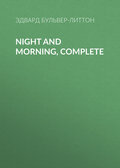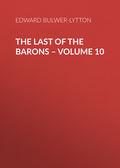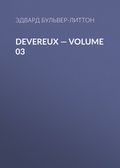
Эдвард Бульвер-Литтон
The Caxtons: A Family Picture — Volume 02
That Uncle Jack should win my heart was no wonder; my mother's he had always won, from her earliest recollection of his having persuaded her to let her great doll (a present from her godmother) be put up to a raffle for the benefit of the chimney-sweepers. "So like him,—so good!" she would often say pensively. "They paid sixpence apiece for the raffle,—twenty tickets,—and the doll cost L2. Nobody was taken in, and the doll, poor thing (it had such blue eyes!) went for a quarter of its value. But Jack said nobody could guess what good the ten shillings did to the chimney-sweepers." Naturally enough, I say, my mother liked Uncle Jack; but my father liked him quite as well,—and that was a strong proof of my uncle's powers of captivation. However, it is noticeable that when some retired scholar is once interested in an active man of the world, he is more inclined to admire him than others are. Sympathy with such a companion gratifies at once his curiosity and his indolence; he can travel with him, scheme with him, fight with him, go with him through all the adventures of which his own books speak so eloquently, and all the time never stir from his easy-chair. My father said "that it was like listening to Ulysses to hear Uncle Jack!" Uncle Jack, too, had been in Greece and Asia Minor, gone over the site of the siege of Troy, eaten figs at Marathon, shot hares in the Peloponnesus, and drunk three pints of brown stout at the top of the Great Pyramid.
Therefore, Uncle Jack was like a book of reference to my father. Verily at times he looked on him as a book, and took him down after dinner as he would a volume of Dodwell or Pausanias. In fact, I believe that scholars who never move from their cells are not the less an eminently curious, bustling, active race, rightly understood. Even as old Burton saith of himself—"Though I live a collegiate student, and lead a monastic life, sequestered from those tumults and troubles of the world, I hear and see what is done abroad, how others run, ride, turmoil, and macerate themselves in town and country,"—which citation sufficeth to show that scholars are naturally the most active men of the world; only that while their heads plot with Augustus, fight with Julius, sail with Columbus, and change the face of the globe with Alexander, Attila, or Mahomet, there is a certain mysterious attraction, which our improved knowledge of mesmerism will doubtless soon explain to the satisfaction of science, between that extremer and antipodal part of the human frame, called in the vulgate "the seat of honor," and the stuffed leather of an armed chair. Learning somehow or other sinks down to that part into which it was first driven, and produces therein a leaden heaviness and weight, which counteract those lively emotions of the brain that might otherwise render students too mercurial and agile for the safety of established order. I leave this conjecture to the consideration of experimentalists in the physics.
I was still more delighted than my father with Uncle Jack. He was full of amusing tricks, could conjure wonderfully, make a bunch of keys dance a hornpipe, and if ever you gave him half-a-crown, he was sure to turn it into a halfpenny.
He was only unsuccessful in turning my halfpennies into half-crowns.
We took long walks together, and in the midst of his most diverting conversation my uncle was always an observer. He would stop to examine the nature of the soil, fill my pockets (not his own) with great lumps of clay, stones, and rubbish, to analyze when he got home, by the help of some chemical apparatus he had borrowed from Mr. Squills. He would stand an hour at a cottage door, admiring the little girls who were straw-platting, and then walk into the nearest farmhouses, to suggest the feasibility of "a national straw-plat association." All this fertility of intellect was, alas! wasted in that ingrata terra into which Uncle Jack had fallen. No squire could be persuaded into the belief that his mother-stone was pregnant with minerals; no farmer talked into weaving straw-plat into a proprietary association. So, even as an ogre, having devastated the surrounding country, begins to cast a hungry eye on his own little ones, Uncle Jack's mouth, long defrauded of juicier and more legitimate morsels, began to water for a bite of my innocent father.
CHAPTER III
At this time we were living in what may be called a very respectable style for people who made no pretence to ostentation. On the skirts of a large village stood a square red-brick house, about the date of Queen Anne. Upon the top of the house was a balustrade,—why, Heaven knows, for nobody, except our great tom-cat, Ralph, ever walked upon the leads; but so it was, and so it often is in houses from the time of Elizabeth, yea, even to that of Victoria. This balustrade was divided by low piers, on each of which was placed a round ball. The centre of the house was distinguishable by an architrave in the shape of a triangle, under which was a niche,—probably meant for a figure; but the figure was not forthcoming. Below this was the window (encased with carved pilasters) of my dear mother's little sitting-room; and lower still, raised on a flight of six steps, was a very handsome-looking door, with a projecting porch. All the windows, with smallish panes and largish frames, were relieved with stone copings; so that the house had an air of solidity and well-to-do-ness about it,—nothing tricky on the one hand, nothing decayed on the other. The house stood a little back from the garden gates, which were large, and set between two piers surmounted with vases. Many might object that in wet weather you had to walk some way to your carriage; but we obviated that objection by not keeping a carriage. To the right of the house the enclosure contained a little lawn, a laurel hermitage, a square pond, a modest greenhouse, and half- a-dozen plots of mignonette, heliotrope, roses, pinks, sweet-William, etc. To the left spread the kitchen-garden, lying screened by espaliers yielding the finest apples in the neighborhood, and divided by three winding gravel-walks, of which the extremest was backed by a wall, whereon, as it lay full south, peaches, pears, and nectarines sunned themselves early into well-remembered flavor. This walk was appropriated to my father. Book in hand, he would, on fine days, pace to and fro, often stopping, dear man, to jot down a pencil-note, gesticulate, or soliloquize. And there, when not in his study, my mother would be sure to find him. In these deambulations, as he called them, he had generally a companion so extraordinary that I expect to be met with a hillalu of incredulous contempt when I specify it. Nevertheless I vow and protest that it is strictly true, and no invention of an exaggerating romancer. It happened one day that my mother had coaxed Mr. Caxton to walk with her to market. By the way they passed a sward of green, on which sundry little boys were engaged upon the lapidation of a lame duck. It seemed that the duck was to have been taken to market, when it was discovered not only to be lame, but dyspeptic,—perhaps some weed had disagreed with its ganglionic apparatus, poor thing. However that be, the good-wife had declared that the duck was good for nothing; and upon the petition of her children, it had been consigned to them for a little innocent amusement, and to keep them out of harm's way. My mother declared that she never before saw her lord and master roused to such animation. He dispersed the urchins, released the duck, carried it home, kept it in a basket by the fire, fed it and physicked it till it recovered; and then it was consigned to the square pond. But lo! the duck knew its benefactor; and whenever my father appeared outside his door, it would catch sight of him, flap from the pond, gain the lawn, and hobble after him (for it never quite recovered the use of its left leg) till it reached the walk by the peaches; and there sometimes it would sit, gravely watching its master's deambulations, sometimes stroll by his side, and, at all events, never leave him till, at his return home, he fed it with his own hands; and, quacking her peaceful adieus, the nymph then retired to her natural element.
With the exception of my mother's favorite morning-room, the principal sitting-rooms—that is, the study, the diningroom, and what was emphatically called "the best drawing-room," which was only occupied on great occasions—looked south. Tall beeches, firs, poplars, and a few oaks backed the house, and indeed surrounded it on all sides but the south; so that it was well sheltered from the winter cold and the summer heat. Our principal domestic, in dignity and station, was Mrs. Primmins, who was waiting gentlewoman, housekeeper, and tyrannical dictatrix of the whole establishment. Two other maids, a gardener, and a footman, composed the rest of the serving household. Save a few pasture-fields, which he let, my father was not troubled with land. His income was derived from the interest of about L15,000, partly in the Three per Cents, partly on mortgage; and what with my mother and Mrs. Primmins, this income always yielded enough to satisfy my father's single hobby for books, pay for my education, and entertain our neighbors, rarely indeed at dinner, but very often at tea. My dear mother boasted that our society was very select. It consisted chiefly of the clergyman and his family; two old maids who gave themselves great airs; a gentleman who had been in the East India service, and who lived in a large white house at the top of the hill; some half-a-dozen squires and their wives and children; Mr. Squills, still a bachelor; and once a year cards were exchanged—and dinners too—with certain aristocrats who inspired my mother with a great deal of unnecessary awe, since she declared they were the most good-natured, easy people in the world, and always stuck their cards in the most conspicuous part of the looking- glass frame over the chimney-piece of the best drawing-room. Thus you perceive that our natural position was one highly creditable to us, proving the soundness of our finances and the gentility of our pedigree,—of which last more hereafter. At present I content myself with saying on that head that even the proudest of the neighboring squirearchs always spoke of us as a very ancient family. But all my father ever said, to evince pride of ancestry, was in honor of William Caxton, citizen and printer in the reign of Edward IV.,—Clarum et venerabile nomen! an ancestor a man of letters might be justly vain of.
"Heus," said my father, stopping short, and lifting his eyes from the Colloquies of Erasmus, "salve multum, jucundissime."
Uncle Jack was not much of a scholar, but he knew enough Latin to answer, "Salve tantundem, mi frater."
My father smiled approvingly. "I see you comprehend true urbanity, or politeness, as we phrase it. There is an elegance in addressing the husband of your sister as brother. Erasmus commends it in his opening chapter, under the head of Salutandi formuloe. And indeed," added my father, thoughtfully, "there is no great difference between politeness and affection. My author here observes that it is polite to express salutation in certain minor distresses of nature. One should salute a gentleman in yawning, salute him in hiccuping, salute him in sneezing, salute him in coughing,—and that evidently because of your interest in his health; for he may dislocate his jaw in yawning, and the hiccup is often a symptom of grave disorder, and sneezing is perilous to the small blood-vessels of the head, and coughing is either a tracheal, bronchial, pulmonary, or ganglionic affection."







